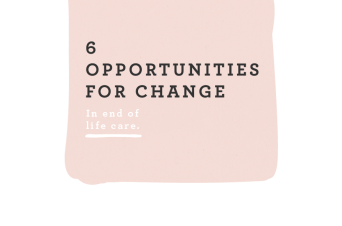
What is innovation, and what does it have to offer end of life care?
news | 04 Oct 2017
Over the last year, we’ve been working on an end of life innovation programme, Better Endings. Based in Lambeth and Southwark, and funded by Guy’s and St Thomas’ Charity, we’ve been exploring what radically better end of life care could look like.
Why are we doing this? Death is the universal experience we all share. Yet despite its ubiquity, the current support for people at the end of life, and those caring for them, is woefully inadequate. Too often people die alone, afraid, or in circumstances against their wishes. And too often people’s lives are irrevocably damaged by the lack of support they receive when caring for someone that is dying, or through the loss of someone they love.
It doesn’t have to be this way. The hospice movement has pioneered holistic, specialist care for people that are dying. There are also examples of community support from around the globe, such as in Kerala, which demonstrate that better deaths are not something we must rely on professionals for – we can all play a part in helping each other to die and grieve better.
Over the next few months, with our partners, we will be sharing what we’ve learned about why innovation is needed in end of life care, how we can approach it, and what better endings might look like. Innovation Unit will be co-producing a series of blogs with people we have worked with as part of Better Endings, which will be published on eHospice.
In the first of these, Heather Richardson, joint chief executive of St Christopher’s Hospice, and Antonia Bunnin, Hospice UK’s director of hospice support and development, write about why radical change is needed in end of life care. Future blogs will explore:
- The role of ethnographic research in radical innovation
- Creating communities for change in end of life care
- Innovation Unit’s approach to innovation in Better Endings
- The importance of collaboration in innovation
- The role of hospices in disruptive innovation in end of life care
We look forward to hearing from others what they think the role of innovation is in end of life care – and what it might look like.

Better Endings: creating new solutions for end of life care
Everybody deserves great support for themselves and for their families at the end of life. We know that at the moment this doesn’t always happen.
06 Dec 16

Coach4Care workshop – how you can get involved
Coach4Care is a service that improves the resilience and well-being of those who are caring for someone at the end of their life using coaching methods from experienced caregivers.
27 Sep 17

Enough conversation. Let’s do death differently.
It’s Dying Matters Awareness Week: A time when we are all encouraged to talk about death, in the hope that it will help us to ‘die better’ than we would in silence.
11 May 17